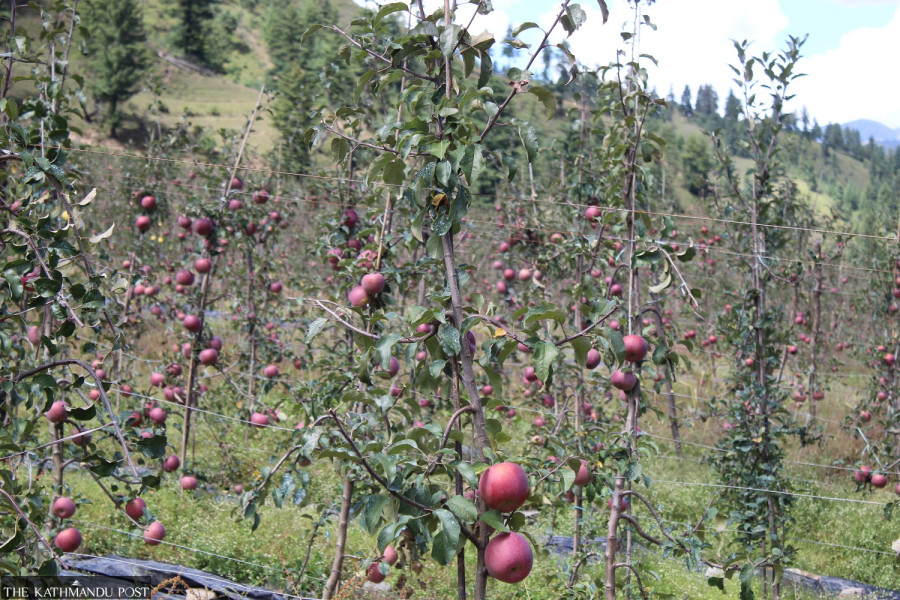Money
Road access boosts Karnali’s apple trade, quality challenges persist
Since July 6, when the Humla headquarters was connected to the national road network, apples from Humla have begun reaching major cities by truck.
Krishna Prasad Gautam
Bhim Bahadur Rokaya of Simkot Rural Municipality–7 in Humla has planted around 300 apple trees on nearly nine ropanis of land. Of these, about 200 trees bore fruit last year, producing roughly 50 quintals of apple.
This year, he is preparing to transport apples to Nepalgunj and Surkhet by road and is busy harvesting. “It’s impossible to send apples by air, since air freight costs Rs120 per kg,” he said. “Now that the road reaches our village, earning Rs300,000 to Rs400,000 a year from apple sales is no longer difficult.”
Dan Bahadur Budha of Simkot-6 is also preparing to sell apples outside this year. He has planted around 250 apple trees on seven ropanis, 100 of which yield fruit. He plans to send at least 40 quintals of apples outside Humla.
Since July 6, when Humla’s district headquarters was connected to the national road network, apples from Humla have begun reaching major cities by truck.
Apples are cultivated on around 518 hectares of land across all seven municipalities of Humla. According to the District Agriculture Development Office, this year’s production is estimated at nearly 4,000 tonnes.
In the past, due to the lack of road access, apples would rot every year. Simkot alone has around 25 large apple farms.
“Even if only 80 percent of the produce finds a market, Humla’s economy could become self-sufficient with apple production within two years,” said Namgyal Tamang, former chair of the Humla Chamber of Commerce and Industry.
In Dolpa, apples grown on around 800 hectares also began reaching outside markets by road last year.
But since the Jajarkot-Dolpa road has not yet been blacktopped and many rivers still lack bridges, Govinda Bahadur Malla, acting agriculture development officer of the Apple zone under the Agriculture Modernisation Project, said only 4,000 tonnes of the 7,000 tonnes of apples produced last year could be marketed outside.
He estimates that production has increased this year, reaching around 8,000 tonnes.
Along with Dolpa and Humla, apples are grown in all local units of the Himalayan districts of Karnali—Jumla, Mugu, and Kalikot.
Jumla produces the most, with about 12,500 tonnes harvested annually from 3,100 hectares.
Apple farming has spread widely across Jumla’s villages. The most common varieties in Karnali are Fuji, Gala, Red King and Golden, said Min Bahadur Bhandari of Guthichaur Rural Municipality-5 in Jumla.
Over the past four years, he has invested around Rs220 million in an apple orchard.
With 48,000 saplings planted, his farm produced 80 tonnes of apples last year. Traders come directly to his orchard to buy apples, and his farm aims to produce 200 tonnes this year.
Tanka Giri, another apple grower of Guthichaur-3, said demand for Jumla’s apples has now reached international markets.
He has invested Rs75 million to establish an orchard with 14,000 trees on 22 hectares.
“Earlier, without roads, apples would end up as cattle feed since they couldn’t reach the market,” he said. “Now demand is pouring in from across Nepal—it’s hard to keep up.”
In 2000, the 14th District Council of Jumla declared the district organic and launched the “One Household, One Apple Orchard” campaign.
According to the District Agriculture Development Office, around 16,000 of Jumla's 19,000 households now grow apples. Currently, apples sell for Rs50 per kg in Jumla, said Man Prasad Neupane. He complains that the lack of proper storage and management has reduced their value.
Frequent blockages of the Karnali Highway have hit apple farmers hard. “Road closures have been our fate for years,” said Karn Bahadur Budhthapa, an apple trader in Jumla. “Even a one-day blockade causes apples worth millions to rot.”
He reported losing nearly two tonnes of apples during nine days of road closures in the past three weeks. He is currently buying apples from farmers at Rs50 per kg. Packaging and transport costs increase the price by another Rs20 per kg by the time apples reach Surkhet and Nepalgunj.
He complained that even when stored in rented cold stores in Nepalgunj, apples are sold for only Rs100 per kg. Indian apples, by contrast, sell for Rs120 per kg, limiting sales. He said Jumla apples outside the cold storage are generally unavailable after Dashain-Tihar.
Manoj Bohora, another trader, said apples cost Rs50 per kg in Jumla and sell for as much as Rs250 per kg in Kathmandu. “The gap of Rs200 per kg between farmers and consumers is unfair. Transport, packaging, and grading cost at most Rs50–70,” he said.
The biggest profits go to Kathmandu traders and middlemen.
He complained that apples must be harvested before they are fully ripe due to the lack of cold storage, packaging, and grading facilities.
According to the Ministry of Land Management, Agriculture, and Cooperatives, apples are grown on 3,419 hectares in Karnali. Last year, the region produced 31,102 tonnes of apples.
Parshuram Rawat, acting secretary at the ministry, expects a similar output this year. He noted that storage problems, lack of grading, poor roads, and packaging issues prevent Karnali’s apples from reaching markets at reasonable prices.
“Farmers cannot get proper markets or prices. They sell apples for Rs50 per kg, while the price is Rs125 in Surkhet and Rs250 in Kathmandu,” he said. “Without organised marketing, farmers suffer from low prices while consumers pay high ones, and profits go mainly to wholesalers and middlemen.”
He said that 1,181 tonnes of apples were supplied to the market last year, generating Rs331.5 million in transactions.
Currently, trucks carrying food and construction materials to Surkhet and Nepalgunj return loaded with apples from Jumla, Mugu, and Kalikot. In Mugu, some farmers send raw apples to the market as early as late July, fearing they won’t sell later.
Although juicy and sweet apples ripen after August 31, farmers are compelled to sell early since apples from across the region flood markets at once, said Karn Bahadur Mahatara of Talcha, Mugu.
“Half our apples are sold raw,” he said. “Even selling at Rs50 per kg barely covers costs. We haven’t made the profits we expected from farming. If wholesale traders came directly, we’d get a fairer deal.”
According to Rawat, apples from Karnali supply about 47 percent of Nepal’s domestic market between September and November.
He said Karnali apples now reach all corners of the country. They are fully organic, without chemical fertilisers or pesticides used.
If farmers could focus on quality, grading, labelling, and packaging, international demand would also rise, he said. Recently, however, pests such as woolly aphids, codling moths, and fungal diseases have begun affecting production.




 12.12°C Kathmandu
12.12°C Kathmandu














